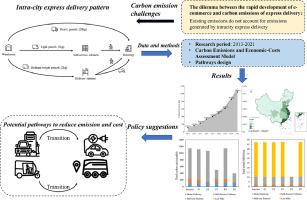Assessing the environmental and economic impacts of intracity express delivery: Pathways for carbon reduction and cost efficiency in China
IF 11.2
1区 环境科学与生态学
Q1 ENGINEERING, ENVIRONMENTAL
引用次数: 0
Abstract
With the rapid development of e-commerce, the environmental impacts and economic costs of intracity express delivery, along with reduction pathways, however, remain largely unexplored. Therefore, we compiled carbon emission inventories of express delivery at the intracity scale covering the entire process from warehouse to consumers. Additionally, five pathways were designed and compared to explore the feasible measures for coordinated carbon reduction and cost-effective efficiency improvements, incorporating new technologies such as electric vehicles and autonomous driving. The results show that carbon emissions from intracity express delivery in China surged from 97 kt in 2013 to 1143 kt in 2021. A series of measures could reduce carbon emissions by 64.86 % (741.287 kt) through the electrification of gasoline vehicles, although the vehicle cost of electric vehicles would triple. If unmanned electric vehicles are used for the last mile of express delivery, the economic costs could decrease significantly by 77.77 % (US$36.693 billion), reducing the cost per express from US$0.436 down to US$0.097. Our study could provide a theoretical basis for the sustainable development and costs reduction of China's express delivery industry.

评估城内快递对环境和经济的影响:中国减少碳排放和提高成本效益的途径
随着电子商务的快速发展,城内快递的环境影响和经济成本以及减排途径在很大程度上仍未得到探索。因此,我们编制了城内快递的碳排放清单,涵盖了从仓库到消费者的整个过程。此外,我们还设计并比较了五种途径,以探索协调减少碳排放和提高效率成本效益的可行措施,并将电动汽车和自动驾驶等新技术纳入其中。结果显示,中国城内快递的碳排放量从 2013 年的 97 千吨激增至 2021 年的 1143 千吨。通过一系列措施,汽油车电气化可使碳排放量减少 64.86 %(741.287 kt),但电动车的车辆成本将增加两倍。如果在快递的最后一英里使用无人驾驶电动汽车,经济成本将大幅降低 77.77 %(366.93 亿美元),每件快递的成本将从 0.436 美元降至 0.097 美元。我们的研究可为中国快递业的可持续发展和降低成本提供理论依据。
本文章由计算机程序翻译,如有差异,请以英文原文为准。
求助全文
约1分钟内获得全文
求助全文
来源期刊

Resources Conservation and Recycling
环境科学-工程:环境
CiteScore
22.90
自引率
6.10%
发文量
625
审稿时长
23 days
期刊介绍:
The journal Resources, Conservation & Recycling welcomes contributions from research, which consider sustainable management and conservation of resources. The journal prioritizes understanding the transformation processes crucial for transitioning toward more sustainable production and consumption systems. It highlights technological, economic, institutional, and policy aspects related to specific resource management practices such as conservation, recycling, and resource substitution, as well as broader strategies like improving resource productivity and restructuring production and consumption patterns.
Contributions may address regional, national, or international scales and can range from individual resources or technologies to entire sectors or systems. Authors are encouraged to explore scientific and methodological issues alongside practical, environmental, and economic implications. However, manuscripts focusing solely on laboratory experiments without discussing their broader implications will not be considered for publication in the journal.
 求助内容:
求助内容: 应助结果提醒方式:
应助结果提醒方式:


